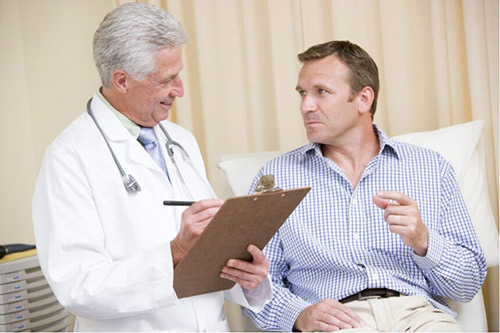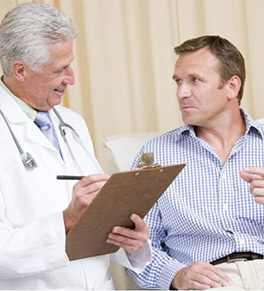
June is Men’s Health Month and a great time to shed light on a health issue many men don’t like to talk about: low testosterone. There’s no shame in testosterone levels dropping—testosterone declines for most men as they age—but due to some of the associated symptoms many men are embarrassed to talk about it. Men’s Health Month is the perfect time to reduce the stigma.
What Is Testosterone?
Testosterone, although produced by both men and women, is predominantly a male sex hormone. In men it is produced by the testes, and it helps regulate:
- Body fat
- Bone density
- Facial and body hair
- Muscle mass and strength
- Red blood cells
- Sex drive
- Sperm production
Testosterone production peaks in adolescence and early adulthood, then begins declining by about 1 percent per year, generally some time between the ages of 30 and 40. A low level of testosterone is called hypogonadism, and the decrease itself is known as andropause.
What Are Healthy Testosterone Levels?
There is no threshold for healthy testosterone levels. It depends on the presence or absence of symptoms. One man could have testosterone levels that could be considered low, yet if he has no symptoms then his levels are healthy. Another could have levels in the normal range, but also have symptoms.
Dr. Anthony Maffei explains that testosterone levels aren’t so cut-and-dried for yet another reason: total testosterone versus free testosterone. Testosterone-binding globulin—molecules in the blood—attach themselves to testosterone molecules and render them inactive. As men age, testosterone-binding globulin increases, which reduces free testosterone.
“Think of free testosterone as baseballs floating around our body,” says Dr. Maffei. “Once these baseballs hit a bat, action takes place. Testosterone-binding globulin are like a bunch of mitts holding onto these baseballs and preventing them from coming into contact with the bat.”
What Are Some Signs of Low Testosterone?
Hypogonadism can produce a wide range of physical, mental and emotional symptoms. Here’s what to look for if you think your testosterone levels are dropping.
Muscle loss—Losing muscle mass is something most men go through as they age. This is known as age-related sarcopenia, and is due in part to declining testosterone levels.
Increased body fat—The flip-side to muscle loss is fat gain. There is somewhat of a chicken-and-egg scenario regarding reduced testosterone and increased body fat, but obesity has been associated with low testosterone levels.
Low libido—This is one of the hallmark symptoms of hypogonadism. It is different from erectile dysfunction in that it is a mental or emotional symptom—you simply don’t have the desire or arousal that you used to.
Erectile dysfunction—Erectile dysfunction (ED) can appear independently of or concurrently with low libido. Whereas low libido is a mental or emotional change, erectile dysfunction is physical and mechanical.
Depression—Testosterone helps men regulate mood, so if you’ve found yourself feeling down lately, you may be experiencing andropause. Depression in men can often manifest as anger and aggression, substance abuse and risk-taking behavior, so be on the lookout for those changes as well.
Gynecomastia—Andropause can cause swollen and enlarged breasts in men, a condition known as gynecomastia.
Osteoporosis—One of the functions of testosterone is to help regulate bone tissue production. The body is constantly remodeling itself, shedding old bone and creating new. With osteoporosis, the shedding of old bone outstrips the creation of new tissue, leading to low bone density and an increased risk of fracture.
How Can Age Management Help?
Age management, or hormone replacement therapy, is a viable option for many men with symptomatic low testosterone, according to Dr. Maffei. When testosterone levels are optimized, he says, it is reasonable to expect:
- Improved lean muscle mass and strength
- Improved erectile function and libido
- Improved bone density
- Improved mood and improvement of depression symptoms
- Elevated red blood cell production, leading to improved oxygen-carrying capacity
“Utilizingacomprehensive, scientific approach to HRT we can mitigate the effects of aging when done in conjunction with diet and exercise to make one feel young again on many levels,” says Dr. Maffei.
If you believe you are experiencing andropause, request an appointment at Advanced Surgeons. We’ll help you determine if our age management services are right for you.

